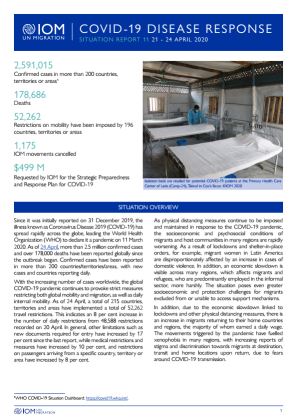-
Countries
-
Data and Analysis
-
Special Focus
-
Crisis Responses
COVID-19 Response - Situation Report 11 (21-24 April 2020)

Contacto
COVID Response HQ covid19ops@iom.int
Idioma
English
Ubicación
Global
Fecha de instantánea
Apr 21 2020
Apr 24 2020
Actividad
- Other
Since it was initially reported on 31 December 2019, the illness known as Coronavirus Disease 2019 (COVID-19) has spread rapidly across the globe, leading the World Health Organization (WHO) to declare it a pandemic on 11 March 2020. As of 24 April, more than 2.5 million confirmed cases and over 178,000 deaths have been reported globally since the outbreak began. Confirmed cases have been reported in more than 200 countries/territories/areas, with new cases and countries reporting daily. With the increasing number of cases worldwide, the global COVID-19 pandemic continues to provoke strict measures restricting both global mobility and migration, as well as daily internal mobility. As of 24 April, a total of 215 countries, territories and areas have implemented a total of 52,262 travel restrictions. This indicates an 8 per cent increase in the number of daily restrictions from 48,588 restrictions recorded on 20 April. In general, other limitations such as new documents required for entry have increased by 17 per cent since the last report, while medical restrictions and measures have increased by 10 per cent, and restrictions on passengers arriving from a specific country, territory or area have increased by 8 per cent. As physical distancing measures continue to be imposed and maintained in response to the COVID-19 pandemic, the socioeconomic and psychosocial conditions of migrants and host communities in many regions are rapidly worsening. As a result of lockdowns and shelter-in-place orders, for example, migrant women in Latin America are disproportionately affected by an increase in cases of domestic violence. In addition, an economic slowdown is visible across many regions, which affects migrants and refugees, who are predominantly employed in the informal sector, more harshly. The situation poses even greater socioeconomic and protection challenges for migrants excluded from or unable to access support mechanisms. In addition, due to the economic slowdown linked to lockdowns and other physical distancing measures, there is an increase in migrants returning to their home countries and regions, the majority of whom earned a daily wage. The movements triggered by the pandemic have fuelled xenophobia in many regions, with increasing reports of stigma and discrimination towards migrants at destination, transit and home locations upon return, due to fears around COVID-19 transmission.
